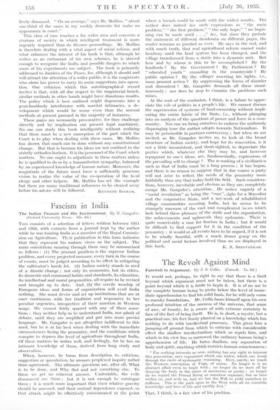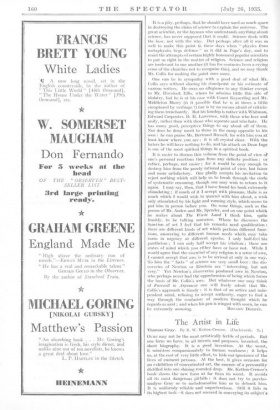The Revolt Against Mind
Farewell to Argument. By J. S. Collie. (Casson. 7s. 6d.) IT would not, perhaps, be right to say that there is a limit beyond which argument must not be taken, but there is a point beyond which it is futile to begin it. It is of no use to the complete human being to probe below the level of imme- diate apprehension to find his solid basis, for he will only come to marshy foundations. Mr. Collis bases himself upon his own profound intuition of the oneness of -the universe, that sense of awe, of beauty, he is aware of with extreme certainty in face of the fact of being itself. He is, in short, a mystic, but a practical one, his feet firmly planted on a knowledge which has
nothing to do with intellectual processes. This gives him a jumping-off ground from which to criticize with considerable
effect the shallow intellectualism which so repels him, and which in his view has so narrowed the ordinary human being's apprehension of life. He hates dualism, any separation of body and spirit, anything which restricts human consciousness :
' " For nothing interests us now, nothing has any right to interest this generation, save experience which can widen, which can break through the circle of systematic reasoning. Here, surely, wo roach the Western conception of Yoga, of union. No longer is• it an abstract affair even to begin with ; no longer do we start off by denying the body in the name of asceticism or purity ; no longer do wo regard the Primal Being as somehow separate, but as hero within us, and with us, had wo but the Will to yield ourselves to stillness. This is the path open to the West with all its scientific knowledge and love of life and earthly feet."
That, I think, is a fair view Of -his position.
It is a pity, perhaps, that he should have used so much space in destroying the claim of science to explain the universe. The great scientist, or the layman who understands anything about science, has never supposed that it could. Science deals with the how, not with the why. But perhaps after all it was as well to make this point in these days when " physics from metaphysics begs defence " as it did in Pope's day, and to resist the attempts of certain highly honoured popular scientists to put us right in the matter of religion. Science and religion are irrelevant to one another (it has for centuries been a crying error of the churches not to recognize• this), and we may thank Mr. Collis for making the point once more.
One can be in sympathy with a good deal of what Mr. Collis says without sharing his standpoint or his estimate of various writers. He owes no allegiance to any thinker except to Mr. Havelock Ellis, whom he admires little this side of idolatry, but he is at his case with Count Keyserling and Mr. Middleton Murry (is it possible that he is at times a little enraptured by verbiage ?) but is by no means afraid of criticiz- ing them trenchantly. But his kinship is rather with Whitman, Edward Carpenter, D. II. Lawrence, with those who love and unify, rather than with those who separate and who hate. He, has many good, perceptive things to say about all of them. Nor does he deny merit to those in the camp opposite to his own : he can praise Mr. Bertrand Russell, for with him you at least know where you are ; it is all crystal clear. With the haters he will have nothing to do, and his attack on Dean Inge is one of the most spirited things in a spirited book.
It is easier to discuss this volume from the point of view of one's personal reactions than from any definite position ; or rather, perhaps, not easier ; for it would be easy enough to destroy him from the purely rational point of view, but fairer and more satisfactOry. One gladly accepts his invitation to reject nothing which will help us to break through the circle of systematic reasoning, though one may wish to return to it again. I may say, then, that I have found his book extremely. stimulating ; , if much of it I accept with pleasure, theiv is as much which I would wish to quarrel with him about, a wish only stimulated by his light and running style, which seems to put him in person before you. On some things, such as the poems of Mr. Auden and Mr. Spender, and .on one point which he makes about The Waste Land I think him, quite frankly, tb be talking nonsense. Where he discusses the function of art I feel that his remarks need qualification :, there arc different kinds of art which perform different time- flans, answering to different human needs which may take turns in urgency at different epochs. I only half-feel his , pantheism ; I can only half accept his vitalism ; these are states of mind which you either have or have not. While I would agree that the essential of any religion is a sense of awe, I cannot accept that awe is to be arrived at only in one way. To him the " facts " of science are very small beer : the dis- coveries of Newton or Einstein are " interesting, but not Very." Yet Newton's discoveries produced awe in Newton, who perhaps never had the apprehension of being which forms the basis of Mr. Collis's awe. , But whatever one may think of Farewell to Argument one will freely admit that Mr. Collis's approach is timely : it is that of an active and inde- pendent mind, refusing to accept authority, eager to find a way through the confusion of modern thought which he regards as arid ; and when his pen is winged with scorn, he can






































 Previous page
Previous page